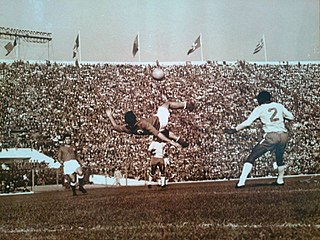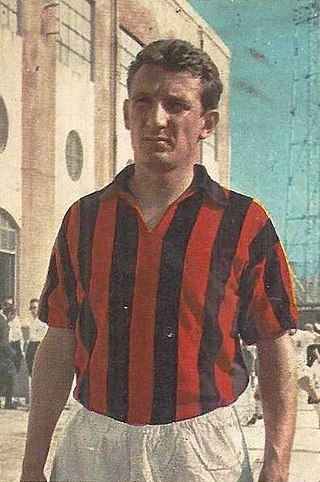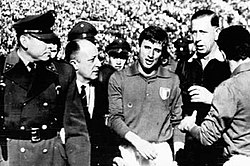
The 1930 FIFA World Cup was the inaugural FIFA World Cup, the world championship for men's national football teams. It took place in Uruguay from 13 to 30 July 1930. FIFA, football's international governing body, selected Uruguay as the host nation, as the country would be celebrating the centenary of its first constitution and the Uruguay national football team had successfully retained their football title at the 1928 Summer Olympics. All matches were played in the Uruguayan capital, Montevideo, the majority at the Estadio Centenario, which was built for the tournament.

The 1962 FIFA World Cup was the seventh edition of the FIFA World Cup, the quadrennial international football championship for senior men's national teams. It was held from 30 May to 17 June 1962 in Chile. The qualification rounds took place between August 1960 and December 1961, with 56 teams entering from six confederations, and fourteen qualifying for the finals tournament alongside Chile, the hosts, and Brazil, the defending champions.

The 1966 FIFA World Cup was the eighth FIFA World Cup, a quadrennial football tournament for men's senior national teams. It was played in England from 11 to 30 July 1966. England defeated West Germany 4–2 in the final to win their first ever World Cup title. The final was level at 2–2 after 90 minutes and went to extra time, when Geoff Hurst scored two goals to complete his hat-trick, the first to be scored in a men's World Cup final. England were the fifth nation to win the event, and the third host nation to win after Uruguay in 1930 and Italy in 1934. Two time reigning champions Brazil failed to get past the group stages as they were defeated by Hungary and Portugal. It was the first time that defending champions were eliminated in the group stages after Italy in 1950. This would not occur again until 36 years later. It was opened by Queen Elizabeth II during the opening ceremony.

The 1974 FIFA World Cup was the tenth FIFA World Cup, a quadrennial football tournament for men's senior national teams, and was played in West Germany between 13 June and 7 July. The tournament marked the first time that the current trophy, the FIFA World Cup Trophy, created by the Italian sculptor Silvio Gazzaniga, was awarded. The previous trophy, the Jules Rimet Trophy, had been won for the third time by Brazil in 1970 and awarded permanently to the Brazilians. This was the first out of three World Cups to feature two rounds of group stages.

The 1982 FIFA World Cup was the 12th FIFA World Cup, a quadrennial football tournament for men's senior national teams, and was played in Spain from 13 June to 11 July 1982. The tournament was won by Italy, who defeated West Germany 3–1 in the final held in the Santiago Bernabéu Stadium in the capital, Madrid. It was Italy's third World Cup title, but their first since 1938. The defending champions, Argentina, were eliminated in the second round. Algeria, Cameroon, Honduras, Kuwait and New Zealand made their first appearances in the finals.

Kenneth George Aston, MBE was an English teacher, soldier, and football referee, who was responsible for many important developments in football refereeing - including the yellow and red penalty card system.
The Battle of Berne was a football match at the 1954 World Cup between Hungary and Brazil, a quarter-final played on 27 June 1954 at the Wankdorf Stadium in Bern, Switzerland. Violent conduct and fighting prompted English referee Arthur Ellis to send off three players during the match. Fighting between the teams continued in the dressing rooms after the final whistle.

Giovanni Ferrari was an Italian footballer who played as an attacking midfielder/inside forward on the left. He is regarded as one of the best players of his generation, having won the Serie A 8 times, as well as two consecutive FIFA World Cup titles with the Italy national football team. Along with Giuseppe Meazza and Eraldo Monzeglio, he is one of only three Italian players to have won two World Cups.

In the sport of association football, fouls and misconduct are acts committed by players which are deemed by the referee to be unfair and are subsequently penalised. An offence may be a foul, misconduct or both depending on the nature of the offence and the circumstances in which it occurs. Fouls and misconduct are addressed in Law 12 of the Laws of the Game. A foul is an unfair act by a player, deemed by the referee to contravene the game's laws, that interferes with the active play of the match. Fouls are punished by the award of a free kick to the opposing team. A list of specific offences that can be fouls are detailed in Law 12 of the Laws of the Game ; these mostly concern unnecessarily aggressive physical play and the offence of handling the ball. An infringement is classified as a foul when it meets all the following conditions:
- It is committed by a player ;
- It occurs on the field of play;
- It occurs while the ball is in play;
- It is committed against an opponent.

Leonel Guillermo Sánchez Lineros was a Chilean professional footballer who played as a striker or on the left wing.

The 1973 FA Cup final was the 92nd final of the FA Cup. It took place on 5 May 1973 at Wembley Stadium and was contested between Leeds United, the previous season's winners and one of the dominant teams in English football at the time, and Sunderland, then playing in the Second Division.

Honorino Landa Vera was a Chilean footballer who played as a forward.

Mario David was an Italian footballer and manager, who played as a defender.

Chile national under-20 football team, also known as Chile Sub-20 or La Rojita, is part of the Federación de Fútbol de Chile. The U-20 team is considered to be the breeding ground for future Chile national football team players. The Chile U-20 national team has participated in seven U-20 World Cups Chile 1987, Qatar 1995, Argentina 2001, Netherlands 2005, Canada 2007 and Turkey 2013. they will participate in Chile 2025.
The Battle of Nuremberg is the nickname of a football match played in the round of 16 of the 2006 FIFA World Cup between Portugal and the Netherlands at the Frankenstadion in Nuremberg on 25 June 2006. Russian referee Valentin Ivanov issued a FIFA World Cup record four red cards and 16 yellow cards, setting a new record for cards shown at any FIFA-administered international tournament.
Russia has participated in 4 FIFA World Cups since its independence in December 1991. The Russian Federation played their first international match against Mexico on 16 August 1992, winning 2–0. Their first participation in a World Cup was in the United States in 1994 where they achieved 18th place.
The history of the Chilean national football team dates back to the team's formation and its first ever international match in 1910.
Group 4 of the 1966 FIFA World Cup consisted of Chile, Soviet Union, Italy, and North Korea. Play began on 12 July 1966 and concluded on 20 July 1966. Soviet Union won the group and North Korea finished as runners-up on their World Cup debut, and both advanced to the quarter-finals. Italy and Chile failed to advance.
Group 2 of the 1962 FIFA World Cup took place from 30 May to 7 June 1962. The group consisted of Chile, Italy, Switzerland, and West Germany.














